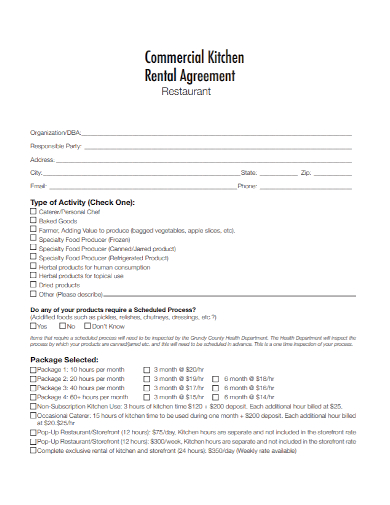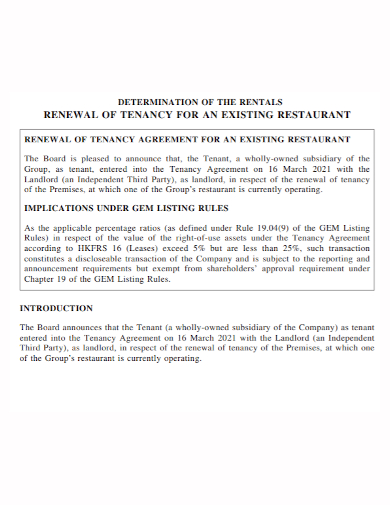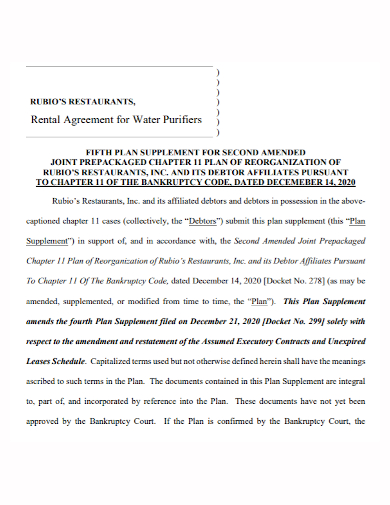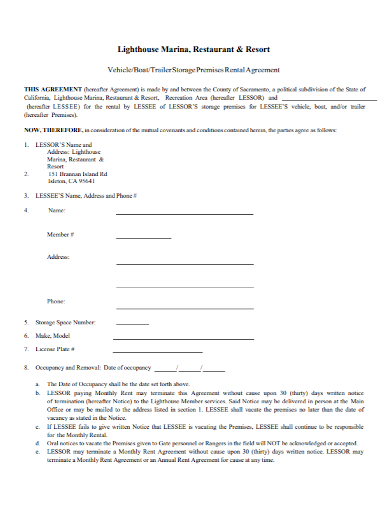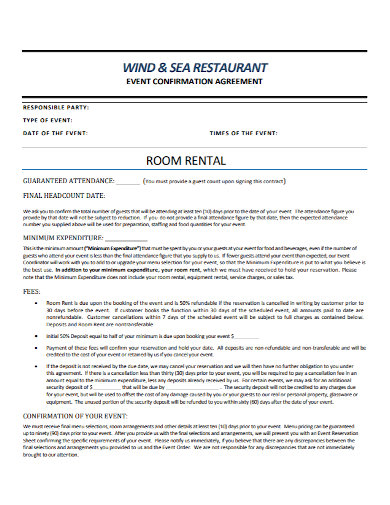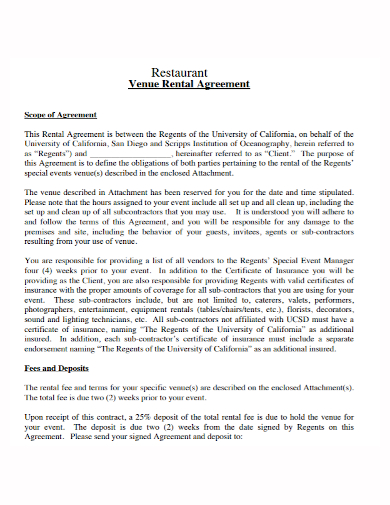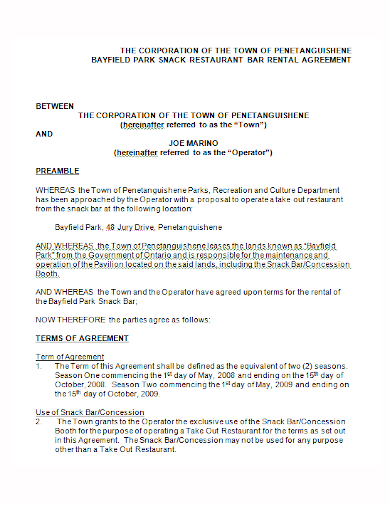Suppose you have a property that’s conveniently located right in the middle of the city’s business district. And unlike any property in the area, this site is susceptible to a significant traffic of employees and business people who pass by and go through their days. Now the smartest thing to do with properties like these is to take advantage of this high traffic area by establishing a business. For example a restaurant, since a lot of people come and go in this particular area, it’s almost certain that you’ll have a significant number of customers in no time. Because in it’s simplest form, that’s how business works. Taking advantage of the demand.
However, if you are not able to establish your own business due to some prior arrangements that need taking care of, the second best thing to do is to have this property rented. Have someone else establish their own restaurant on your property. You’ll still be raking in a significant revenue from the rental payments, and property value significantly increase when the property itself has a lot of potential, especially for business ventures such as restaurants. Now, in order to make sure that you and your potential tenant is on the same page when it comes to the terms of the rental, you’ll need to draft a restaurant rental agreement.
It is widely common for property owners to draft a rental agreement prior to the start of the rental. Rental agreements protect your rights as a property owner and your property itself. If by an unfortunate chance you and and your client come across a legal issue, you will have a better chance of having a favorable outcome in court if you have a written agreement on hand. The document ensures that whatever your client may be up to in your property, it is within the terms that you have presented and discussed in your rental agreement. It just saves you a whole lot of trouble from being scammed or taken advantage of by your tenants.
There have been some pretty big cases of landlords and property owners being cheated of their own properties by the people their leasing the property to due to the lack of sufficient documentations that could defend them in court. That is why before any kind of business comes through, it is imperative that a restaurant rental agreement is drafted and that the both parties have agreed to. To effectively draft this document, make sure that you completely know the document beforehand and is familiar with what it is and how it works. Check out these restaurant rental agreement samples that we have listed for you down below. Once you’ve gotten yourself acquainted enough with the document, feel free to use these samples as guides or even as templates for your own restaurant rental agreement.
8+ Restaurant Rental Agreement Samples
1. Restaurant Rental Agreement Template
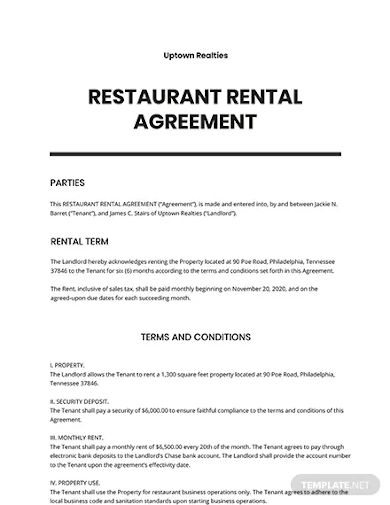
2. Restaurant Short Term Rental Agreement Template
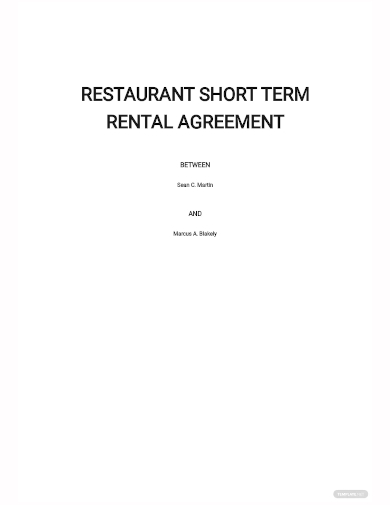
3. Commercial Restaurant Rental Agreement
4. Restaurant Tenancy Rental Agreement
5. Restaurant Supplemental Rental Agreement
6. Restaurant Vehicle Rental Agreement
7. Restaurant Room Rental Agreement
8. Restaurant Venue Rental Agreement
9. Restaurant Bar Rental Agreement
What Is a Restaurant Rental Agreement?
A restaurant rental agreement, or just about any rental agreement, is a document that serves as a binding contract between you and your tenant or client. The document defines the terms of tenancy and the rules and regulations for the entirety of the lease. Drafting a rental agreement allows a bit of creative freedom on your end because it’s entirely up to you and your property. Most rental agreements are short term agreements, usually around 30-60 days, while long term rentals that spans about a year or so is identified as a lease. A rental agreement is an especially good tool if you want to make sure that the client is reliable enough to not cause any significant amount of trouble or even damage the property itself. Rental agreements are typically easier to terminate than leasing agreements since the duration is significantly shorter than a lease.
How to Write a Restaurant Rental Agreement
A restaurant rental agreement should include specific provisions enough for the document to protect your property and your own welfare. It’s common for property owners to have their attorneys prepare their agreements for themselves. You can include more specific provisions if you want, depending on the scale of your rental or your property. Regardless of shape and size, the document should include these following elements.
1. Identify the parties to the agreement and include the address of your property
Make sure that you list down the names of your client or your tenants and provide them with your details as well. Include all of your names, the address of the rental, and a description of the site if there are no significant details that makes it stand out. Overall, be specific.
2. The term of the rental and how it ends
List how long the duration for the rent is and make sure that they understand it perfectly. Include how much notice should be provided if you or your client decides to terminate the agreement.
3. Rent and security deposit
State how much the monthly cost for the rent is, where the tenant should pay, and what the payment process is going to be. Whether you accept cash, card, or virtual payments, and if you want you client to mail the payment, you should include the mailing address as well.
4. What is included with the rental
List the inclusions of the rental, utilities of amenities. Electric, heat, gas, cable, etc. If there are no utilities included, state the client’s responsibilities to provide for their own utilities. Provide a clear description of what is included in the agreement and what isn’t. State if you are providing appliances and furniture, list them by their names.
5. Pets
Include a provision telling them about the inclusion of pets into the property. If you opt to have a no-pet policy, state that in your agreement as well.
6. Occupant’s name and the total number of occupants
State if you don’t want any additional occupants more than what the client has originally offered. List the names of all the occupants who are allowed to reside on the property and the ones that they can accommodate.
7. Landlord’s access to the property to do repairs and maintenance
Be clear about the notices that you’ll be giving to enter the premises for routine repairs, maintenance, and inspections. Other than for emergency matters. Some local communities have their own requirements for the notices, while some states have consistent requirements all throughout.
8. Rules of the rental
List all the things that you expect the tenant to follow such as no illicit or illegal activities, no smoking on site, and that the property must be closed at a particular time of the day or night. Make it clear that you’ll terminate the rental agreement if the client fails to follow and uphold these rules and regulations, and that the client is responsible for the legal fees if issues reach the court of law.
9. Damaged property
State that the client is responsible for any damages incurred to the property and its surroundings. The client must be able to turn-over the property in the condition that is was originally in.
10. Signatures
You and your client should then sign the document and have it bound legally by an attorney of law or a notary.
FAQs
How much should a restaurant spend on rent?
In a lot of cases, the industry’s collective experience shows that a lease should cost at least 5 to 8 percent of the restaurant’s total revenues.
Who pays the rent agreement?
The landlord usually keeps the original copy of the rental agreement for safekeeping, and the client or tenant bears the costs associated with the whole rental agreement process.
How long is a lease good for?
A lease commonly lasts for a year or more. Leases can really be for any length of time.
Having your property rented for the sake of business comes with its own fair share of risks. A lot more daunting than others. However, as long as you have a properly drafted rental agreement with these elements, you’ll be protecting yourself from a world of trouble and loss of money. The document provides an easy way for you to effectively impose your authority as the property owner and show your clients that they should be responsible for all the business activity during the full duration of the stay.
Related Posts
Sample Business Agreement between Two Parties
FREE 9+ Shop Rental Agreement Samples [ Commercial, Lease, Tenancy ]
FREE 10+ Charter Agreement Samples In MS Word | Google Docs | Apple Pages | PDF
FREE 10+ Mentoring Agreement Samples In MS Word | Apple Pages | PDF
FREE 10+ Partner Agreement Samples In MS Word | Google Docs | Apple Pages | PDF
FREE 10+ Individual Agreement Samples In MS Word | Google Docs | Apple Pages | PDF
FREE 10+ Strategic Agreement Samples In MS Word | Google Docs | Apple Pages | PDF
FREE 10+ Equity Agreement Samples In MS Word | Google Docs | Apple Pages | PDF
FREE 10+ Producer Agreement Samples in MS Word | Apple Pages | PDF
FREE 10+ Grant Agreement Samples In MS Word | Apple Pages | PDF
FREE 8+ Meeting Agreement Samples in MS Word | Google Docs | Apple Pages | PDF
FREE 10+ Community Agreement Samples In MS Word | Google Docs | PDF
FREE 8+ Real Estate Option Agreement Samples in MS Word | PDF
FREE 10+ Call Option Agreement Samples In MS Word | PDF
FREE 10+ Advertising Agreement Samples In MS Word | Google Docs | Apple Pages | PDF

